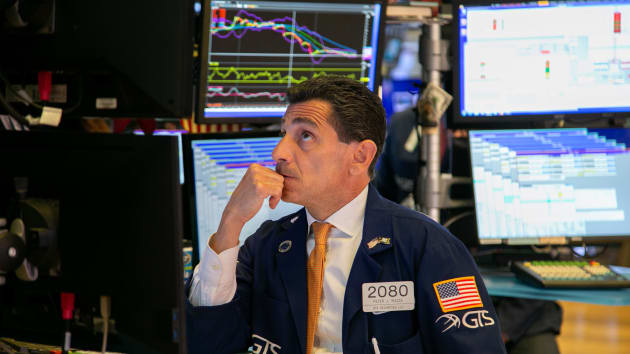
Stocks slipped on Thursday as investors digested the latest reports surrounding the U.S.-China trade war.
The Dow Jones Industrial Average was down 54.8 points, or 0.2% at 27,766.29. The S&P 500 dipped 0.16% to 3,103.54 while the Nasdaq Composite pulled back 0.2% to 8,506.21. Thursday marked the third straight day of losses for the Dow, its longest losing streak since August. The S&P 500 posted its first three-day slide since September. Boeing and Procter & Gamble were the biggest losers in the Dow, falling more than 1% each.
“The U.S. and China don’t know what they want to do on a trade deal,” said Randy Frederick, vice president of trading and derivatives at Charles Schwab. “Every single day it’s something different. They’re close to a deal. Then they’re not close to a deal.”
“As long as these rumors go back and forth, how will the market know what to do? It’s confusing,” Frederick said.
During a phone call thought to have been made late last week, Chinese Vice Premier Liu He invited U.S. Trade Representative Robert Lighthizer and Treasury Secretary Steven Mnuchin to Beijing to sit down for further negotiations, according to a report from The Wall Street Journal.
It was not clear whether U.S. negotiators had accepted Liu’s invitation. However, the Journal’s report said that U.S. trade officials were willing to meet with their Chinese counterparts. Meanwhile, the South China Morning Post said both countries are on the “doorstep” of reaching a deal, citing a source close to the Trump administration.
The reports come after U.S. legislation on Hong Kong had threatened to derail trade discussions between the world’s two largest economies. On Wednesday, the U.S. House of Representatives passed a bill intended to support protesters in Hong Kong. It prompted Beijing to accuse the U.S. of interfering in domestic affairs. Sen. Marco Rubio, R-FL, told CNBC’s “Squawk Box” he hears President Donald Trump will sign the bill.
This “underscores the complexity of US/China negotiations, consistent with our ongoing view that, over the medium term, there does not appear a reliable path to bridging core trade differences that would lead to meaningful tariff deescalation,” said Morgan Stanley strategist Michael Zezas in a note. “However, we don’t think it precludes the possibility of a scaled down phase 1 agreement that keeps further tariff increases at bay for the time being.”
The U.S. and China have imposed tariffs on billions of dollars’ worth of one another’s goods since the start of 2018, battering financial markets and souring business and consumer sentiment.
In corporate news, a source told CNBC’s Becky Quick that Charles Schwab is in talks to buy TD Ameritrade. The news sent TD Ameritrade shares flying by 17% while Schwab’s stock rose more than 8%. A deal between the two would create a company with $5 trillion in combined assets.























